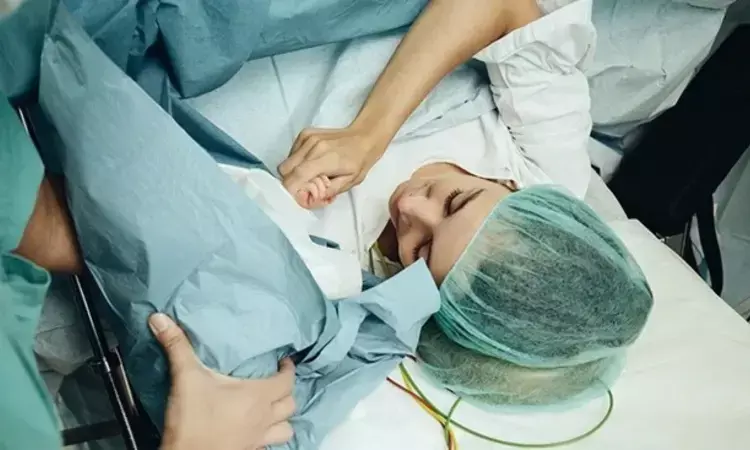- Home
- Medical news & Guidelines
- Anesthesiology
- Cardiology and CTVS
- Critical Care
- Dentistry
- Dermatology
- Diabetes and Endocrinology
- ENT
- Gastroenterology
- Medicine
- Nephrology
- Neurology
- Obstretics-Gynaecology
- Oncology
- Ophthalmology
- Orthopaedics
- Pediatrics-Neonatology
- Psychiatry
- Pulmonology
- Radiology
- Surgery
- Urology
- Laboratory Medicine
- Diet
- Nursing
- Paramedical
- Physiotherapy
- Health news
- Fact Check
- Bone Health Fact Check
- Brain Health Fact Check
- Cancer Related Fact Check
- Child Care Fact Check
- Dental and oral health fact check
- Diabetes and metabolic health fact check
- Diet and Nutrition Fact Check
- Eye and ENT Care Fact Check
- Fitness fact check
- Gut health fact check
- Heart health fact check
- Kidney health fact check
- Medical education fact check
- Men's health fact check
- Respiratory fact check
- Skin and hair care fact check
- Vaccine and Immunization fact check
- Women's health fact check
- AYUSH
- State News
- Andaman and Nicobar Islands
- Andhra Pradesh
- Arunachal Pradesh
- Assam
- Bihar
- Chandigarh
- Chattisgarh
- Dadra and Nagar Haveli
- Daman and Diu
- Delhi
- Goa
- Gujarat
- Haryana
- Himachal Pradesh
- Jammu & Kashmir
- Jharkhand
- Karnataka
- Kerala
- Ladakh
- Lakshadweep
- Madhya Pradesh
- Maharashtra
- Manipur
- Meghalaya
- Mizoram
- Nagaland
- Odisha
- Puducherry
- Punjab
- Rajasthan
- Sikkim
- Tamil Nadu
- Telangana
- Tripura
- Uttar Pradesh
- Uttrakhand
- West Bengal
- Medical Education
- Industry
Esketamine may provide pain relief during C-section without neonatal depression: JAMA

China: A new trial published in JAMA Network Open has found that a subanesthetic dose of esketamine, administered before cesarean delivery, can provide temporary pain relief and sedation without significant neonatal depression.
Although epidural anesthetic is the preferred method for cesarean delivery, additional analgesics are frequently required to ease pain during uterine traction. The purpose of this trial was to look at the sedative and analgesic effects of intravenous esketamine given before childbirth through cesarean delivery while the patient was under epidural anesthesia.
The study was multicenter, double-blind, randomized clinical trial, that involved 903 women, 18 years and older, who were scheduled for elective cesarean delivery with epidural anesthesia in five medical centers in China.
The patients were given an intravenous injection of 0.25 mg/kg of esketamine or placebo before incision. The study's primary outcomes included scores on the numeric rating scale of pain and the Ramsay Sedation Scale immediately after fetal delivery. The secondary outcome was neonatal Apgar score assessed at 1 and 5 minutes after birth.
The study concluded with the following clinical findings:
1. Esketamine resulted in lower pain scores compared to placebo after childbirth, but the difference was not clinically significant.
2. The Ramsay sedation scores were higher with esketamine than with placebo.
3. There was no significant difference in neonatal Apgar scores between the two groups.
4. Transient neurologic or mental symptoms were more common with esketamine than with placebo.
The study concluded that indications and the optimal dose of esketamine in this patient population need further clarification, but the study should be limited to those who require supplemental analgesia.
Dr. Li-Li Xu, the lead author of the study added that “Epidural anesthesia is a primary choice for cesarean delivery, but supplemental analgesics are often required to relieve pain during uterine traction. This new research could provide an alternative option for pain management during cesarean delivery, especially for patients who require supplemental analgesia.”
Reference:
Xu L, Wang C, Deng C, et al. Efficacy and Safety of Esketamine for Supplemental Analgesia During Elective Cesarean Delivery: A Randomized Clinical Trial. JAMA Netw Open. 2023;6(4):e239321.
doi:10.1001/jamanetworkopen.2023.932
Dr. Mahalakshmi Sivashankaran joined Medical Dialogues as an Intern in 2023. She is a BDS graduate from Manipal College of Dental Sciences, Mangalore Batch 2022, and worked as a Junior Resident at VMMC & Safdarjung Hospital at the Department of Dental Surgery till January 2023. She has completed a Diploma in Executive Healthcare management from the Loyola Institute of Business Administration, developing skills in Healthcare Management and Administration. She covers several medical specialties including Dental, ENT, Diagnostics, Pharmacology, Neurology, and Cardiology.
Dr Kamal Kant Kohli-MBBS, DTCD- a chest specialist with more than 30 years of practice and a flair for writing clinical articles, Dr Kamal Kant Kohli joined Medical Dialogues as a Chief Editor of Medical News. Besides writing articles, as an editor, he proofreads and verifies all the medical content published on Medical Dialogues including those coming from journals, studies,medical conferences,guidelines etc. Email: drkohli@medicaldialogues.in. Contact no. 011-43720751


